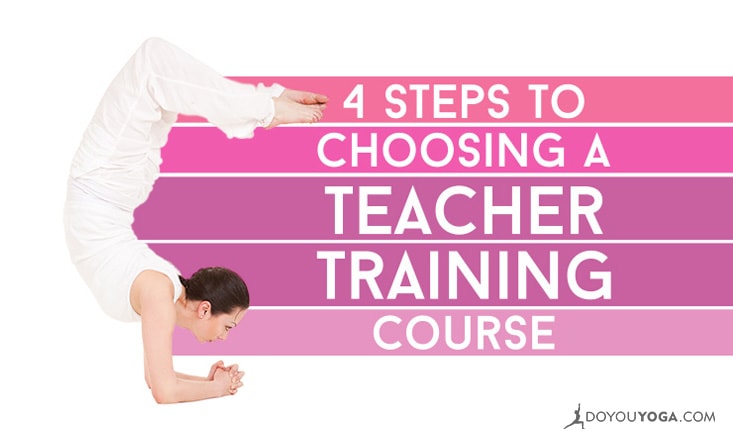Have you thought about attending a yoga teacher training course?
If you’ve had the chance to look for a course, you will find that there are dozens and dozens of options—weekend courses, some at your local studio, immersion programs that last weeks to months, and destination courses at ashrams and seaside resorts.
They can range in price from a few hundred to a few thousand dollars and are taught by anyone from a yoga studio owner to a Swami. How do you know which teacher training course (TTC) is the right one? Quite a few friends and students have asked me what yoga teacher training course I would recommend.
The answer isn’t so simple, and I am vague to respond. While I attended a month-long immersion program at a Sivananda Ashram, my intentions for doing so were personal. My goals might be different from yours.
Although I highly recommend it (it was awesome!), leaving your family and friends for a month to live in a tent and wake up at 5 A.M. for kirtan might not be for everyone. When choosing which yoga TTC to attend, ask yourself the following questions and consider each one very carefully.
1. What is your intention?
The first thing to ask yourself when considering a TTC is what do you want to achieve? Is your intention to dig deeper into your personal stuff? To get more in-tune with your inner yogini? Or do you want to teach a kickass Vinyasa yoga class?
Although I attended Sivananda because I wanted a deeper understanding of the roots of yoga, study of the scriptures, and hours of meditation and kirtan, I don’t teach yoga that way. I teach a really intense fun and flirty hot Vinyasa class! There is no kirtan, spiritual discipline, or Yin postures in my class.
But I went to yoga teacher training knowing I would not be teaching Sivananda yoga, at least not right away. That doesn’t mean I don’t still practice the disciplines that I learned; I have my own practice that is very much in conjunction with my original training.
But I also knew that I had to give students in my community the kind of yoga that would be popular and successful.
2. What is your budget?
Don’t make a decision on which yoga teacher training course to attend based on cost alone. Expensive doesn’t always mean better. At the same time, you get what you pay for.
If a local studio is offering a three-night-a-week course for $1000, find out what the catch is. Some studios are not registered with the Yoga Alliance, and that accreditation can be the difference between great yoga education and a shady TTC.
Also, some studios want students to pay to attend their course so they can teach their style of yoga at their studio. If that is the type of yoga that you want to teach, then go for it! It might be the perfect training for you!
But if you’re looking for something authentic and substantial, maybe reconsider.
3. What is the reputation of the TTC?
A good friend of mine who was a spin/yoga/group fitness instructor, personal trainer, and triathlete wanted to go to a TTC to deepen her yoga practice.
It was around the same time I was visiting the Sivananda ashram again and invited her along, but she decided on a retreat location on the beaches of the Riviera Maya, Mexico because it was less expensive and at a more exotic location. Her time there was great, but she came back feeling like it was all a sham.
The group discussions were centered around the student’s personal problems, and they spent most of their time trying to get into Handstand, Lotus, and twisting bound poses than on learning a basic asana practice that they could take home.
The teachers changed frequently and she became skeptical of their reputation and ability to lead a TTC.
Sometimes yoga studios will plan an exotic retreat and recruit a bunch of students to go. The more students who sign up the cheaper the group rate, so it becomes a chance for the studio to earn extra income while taking a little vacation.
Make sure if you sign up for a retreat, to lower your expectations. Enjoy being with a group of like-minded yogis, have fun, and recharge your batteries. But keep in mind that this type of TTC is probably not the best option if you want a more serious yoga course.
4. Above all, be true to yourself!
Ultimately, you are the one that will be attending the course, so make sure you follow that little voice in your head. If it feels right, it probably is! Studying and practicing yoga is a personal choice and a journey. The journey can be as short or as long as you like it to be.
Yoga has been around for thousands of years, and chances are it will be around for thousands more. It is dynamic, universal, and ever-evolving—like you! As long as you follow your heart and trust yourself, your decision will be perfect.


